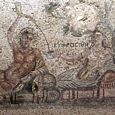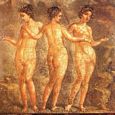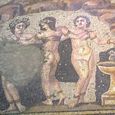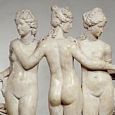EUPHROSYNE
Greek Name
Ευφροσυνη
Transliteration
Euphrosynê
Latin Spelling
Euphrosyne
Translation
Good Cheer, Mirth
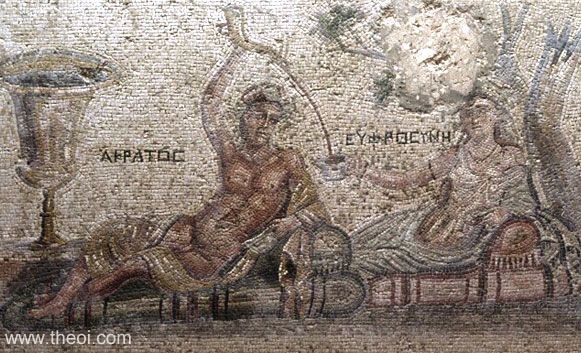
EUPHROSYNE was one of the three Kharites (Charites) and the goddess of good cheer, mirth, merriment and joy. Her name is the feminine form of the Greek word euphrosynos meaning "merriment".
In the mosaic right she is paired with Akratos (Acratus), the celebratory spirit of unmixed wine. She was usually depicted dancing in a circle with her two sisters.
FAMILY OF EUPHROSYNE
PARENTS
[1.1] ZEUS & EURYNOME (Hesiod Theogony 907,
Apollodorus 1.13, Pausanias 9.35.1)
[1.2] ZEUS & EUNOMIA (Orphic Hymn 60)
[2.1] EREBOS & NYX (Hyginus Preface)
ALTERNATE NAMES
Greek Name
Ευθυμια
Transliteration
Euthymia
Latin Spelling
Euthymia
Translation
Good Cheer, Joy
CLASSICAL LITERATURE QUOTES
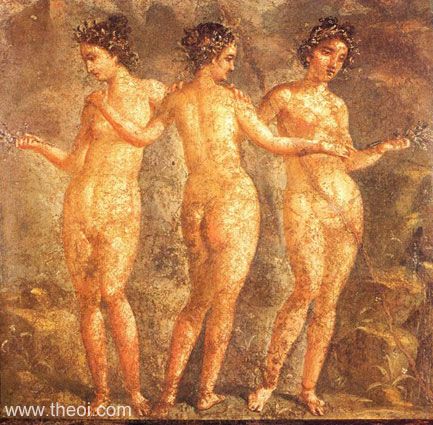
Hesiod, Theogony 907 ff (trans. Evelyn-White) (Greek epic C8th or C7th B.C.)
:
"And Eurynome, the daughter of Okeanos (Oceanus), beautiful in form, bare him [Zeus] three fair-cheeked
Kharites (Charites, Graces), Aglaia (Aglaea), and Euphrosyne, and lovely Thalie (Thalia), from whose eyes as
they glanced flowed love that unnerves the limbs: and beautiful is their glance beneath their brows."
Homer's Epigrams 15 (trans. Evelyn-White) (Greek epic C8th B.C.) :
"Open of yourselves, you doors, for mightly Ploutos (Plutus, Wealth) will enter in, and with Ploutos comes
jolly Euphrosyne (Mirth) and gentle Eirene (Irene, Peace)."
Pindar, Olympian Ode 14. 1 ff (trans. Conway) (Greek lyric C5th B.C.) :
"Whose haunts are by Kephissos' (Cephisus') river, you queens beloved of poets' song, ruling Orkhomenos
(Orchomenus), that sunlit city and land of lovely steeds, watch and ward of the ancient Minyan race, hear now my
prayer, you Kharites (Charites, Graces) three. For in your gift are all our mortal joys, and every sweet thing,
be it wisdom, beauty, or glory, that makes rich the soul of man. Nor even can the immortal gods order at their
behest the dance and festals, lacking the Kharites' aid; who are the steward of all rites of heaven, whose
thrones are set at Pytho beside Apollon of the golden bow, and who with everlasting honour worship the Father,
lord of great Olympos.
Euphrosyne, lover of song, and Aglaia (Aglaea) revered, daughters of Zeus the all-highest, hearken, and with
Thalia, darling of harmony, look on our songs of revel, on light feet stepping to grace this happy hour . . . I
come to praise Asopikhos (Asopichus), whose Minyan house, Thalia, now of your favour wears the pride of the
Olympian victor."
Pindar, Fragment 155 (trans. Sandys) :
"What shall I do to be dear unto thee, O loudly-thundering [Zeus] son of Kronos (Cronus), and dear unto the
Moisai (Muses), and to be cared for by Euthymia (Jollity)?" [N.B. Euthymia is Euphrosyne.]
Pseudo-Apollodorus, Bibliotheca 1. 13 (trans. Aldrich) (Greek mythographer C2nd A.D.)
:
"By Okeanos' (Oceanus') daughter Eurynome he [Zeus] had the Kharites (Charites, Graces), named Aglaia
(Aglaea), Eurphrosyne, and Thaleia (Thalia)."
Pausanias, Description of Greece 9. 35. 1 (trans. Jones) (Greek travelogue C2nd A.D.)
:
"Hesiod in the Theogony says that the Kharites (Charites, Graces) are daughters of Zeus and
Eurynome, giving them the names of Euphrosyne, Aglaia (Aglaea) and Thalia."
Orphic Hymn 60 to the Charites (trans. Taylor) (Greek hymns C3rd B.C. to 2nd A.D.)
:
"Illustrious Kharites (Charites, Graces), mighty named, from Zeus descended, and Eunomia (Good Order) famed
[here equated with Eurynome], Thalia and Aglaia (Aglaea) fair and bright, and blest Euphrosyne, whom joys
delight."
Pseudo-Hyginus, Preface (trans. Grant) (Roman mythographer C2nd A.D.) :
"From Nox (Night) and Erebus : Fatum (Fate), Senectus (Old Age), Mors (Death), Letum (Dissolution),
Continentia (Moderation), Somnus (Sleep), Somnia (Dreams), Amor (Love)--that is Lysimeles--, Epiphron
(Prudence), Porphyrion, Epaphus, Discordia (Discord), Miseria (Misery), Petulantia (Wantonness), Nemesis (Envy),
Euphrosyne (Good Cheer), Amicitia (Friendship), Misericordia (Compassion), Styx (Hatred); the three Parcae
(Fates), namely Clotho, Lachesis and Atropos; the Hesperides."
ANCIENT GREEK & ROMAN ART
SOURCES
GREEK
- Hesiod, Theogony - Greek Epic C8th - 7th B.C.
- Homerica, Homer's Epigrams - Greek Epic C8th - 7th B.C.
- Pindar, Odes - Greek Lyric C5th B.C.
- Pindar, Fragments - Greek Lyric C5th B.C.
- Apollodorus, The Library - Greek Mythography C2nd A.D.
- Pausanias, Description of Greece - Greek Travelogue C2nd A.D.
- The Orphic Hymns - Greek Hymns C3rd B.C. - C2nd A.D.
ROMAN
- Hyginus, Fabulae - Latin Mythography C2nd A.D.
OTHER SOURCES
Other references not currently quoted here: Memnon 42.
BIBLIOGRAPHY
A complete bibliography of the translations quoted on this page.
